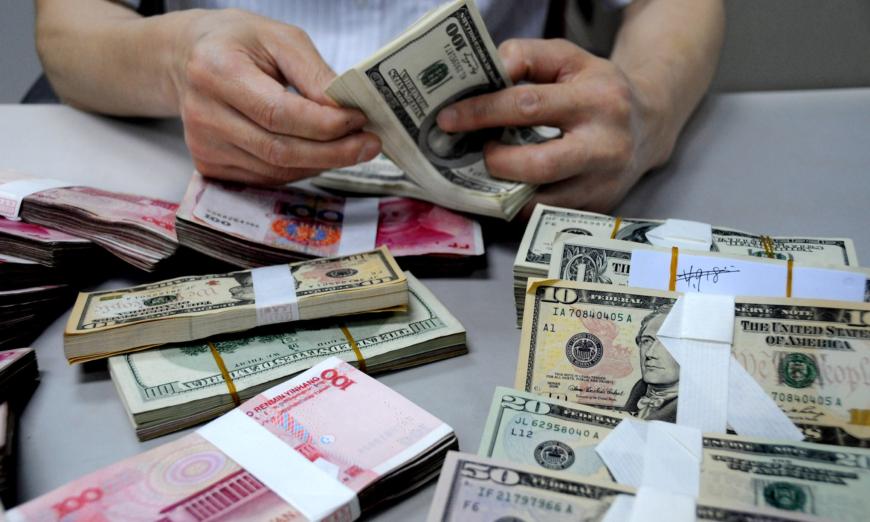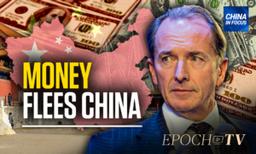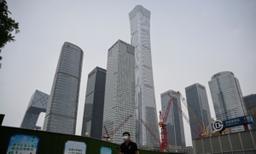
A staff member counts money at a branch of the Bank of China in
Lianyungang, Jiangsu Province, China, on Aug. 10, 2011. (VCG/VCG via
Getty Images)
Foreign investors are rushing to get out of Chinese stocks owing to persistent worries about the country's economic future, ongoing geopolitical tensions, and pressure on the Biden administration to limit American investments in China.
Data compiled by the Washington, .D.C-based Institute of International Finance (IIF), revealed that approximately $3.7 billion was withdrawn from Chinese stocks in the first two weeks of August, marking the second-largest outflow of capital from the country since the COVID-19 outbreak. The net withdrawal was $7.9 billion in October 2022, when China's economy was mired in recession due to China’s zero-COVID policy, according to a a Nikkei report.
Reuters reported on Wednesday, citing a Goldman Sachs study, that global hedge funds are also "aggressively" selling all categories of Chinese stocks, of which 60 percent were A shares, which are listed on the domestic stock market.
This was in sharp contrast to the net inflow of $6.9 billion of funds in June and July, according to the IIF, comprising of inflows of $1.9 billion in June and $7.7 billion in July.
The net inflow of funds in Chinese equities in June and July 2023 was a rebound from the previous months, when China experienced a net outflow of funds due to various factors, such as the regulatory crackdown on the internet sector, the faltering Chinese economy, and the divergence of interest-rate policies between the United States and China
But that has rapidly reversed since the beginning of as investors and hedge funds in the United States that focus on Chinese assets are becoming increasingly wary China’s economy and their exposure to Chinese stocks for the first time since at least 2012.
TigerGlobal, for instance, decreased its holdings in both JD.com and Kanzhun by almost 12 percent, from $1.1 billion to $719.3 million.
The regulatory filings of Coatue Management, founded by Philippe Laffont, formerly of Tiger Management, showed that it had reduced its holdings in Alibaba, Baidu, JD.com, Kanzhun, KE Holdings, Li Auto, and PDD Holding as well.
According to regulatory records, this hedge fund reduced its stake in Alibaba by over 90 percent between March and June. Similarly, D1 Capital Partners sold all 1.7 million shares it had in Alibaba, for $176.8 million.
Moore Capital Management, led by Louis Bacon, divested its stake in Alibaba by selling shares for more than $200 million.
In addition,, small holdings in Alibaba and JD.com were liquidated by Michael Burry's Scion Asset Management.
Withdrawals are also rising in the foreign exchange (FX) markets. In contrast to the $6 billion in inflows seen in June, a Goldman Sachs note said on Wednesday that net FX outflows totaled roughly $26 billion in July.
“While we saw net buying of equities in July, goods trade FX conversion ratio declined, related inflows slowed in July, and services trade deficit widened. In addition, cross-border renminbi transfers showed net outflows in the month,” the note said.
Expectations for a post-COVID growth surge were dashed by data showing an uneven recovery, and tensions between the United States and China contributed to a flight from Chinese assets.
July's financial statistics revealed that credit is tightening, while retail sales and other economic indicators have consistently lagged market estimates. Price indexes and a decline in business confidence both point to China entering deflation.
One of the major private property developers in the country, Country Garden Holdings, is having financial difficulties, and this has prompted concerns about the status of the real estate market.
After state-backed Zhongrong International Trust failed to make principal and income payments on 140 million yuan ($19.3 million) of wealth-management products sold to three listed firms, concerns also grew over the weekend that China's economic slowdown could cause liquidity problems in the financial sector.
Zhongrong’s crisis also highlighted the potential for a broader banking industry liquidity crisis as a result of the nation's economic slump.
At the start of the year, investors anticipated high returns from China's reopened economy and flocked to the country's stock markets. But the country's economic slump has dashed their hopes.
On Sunday, China's State Council also issued guidelines to enhance the country's foreign investment environment and attract more foreign investment, including increased fiscal support and tax incentives for foreign-invested enterprises, such as temporarily exempting withholding income tax on profits reinvested in China by foreign investors. However, considering the country's economic slump, such measures are scarcely motivating any more.
Experts are beginning to agree that China's current economic slowdown is more of a structural than a cyclical problem in light of these issues. It is possible that investors' exodus from Chinese stocks has just begun.


No comments:
Post a Comment